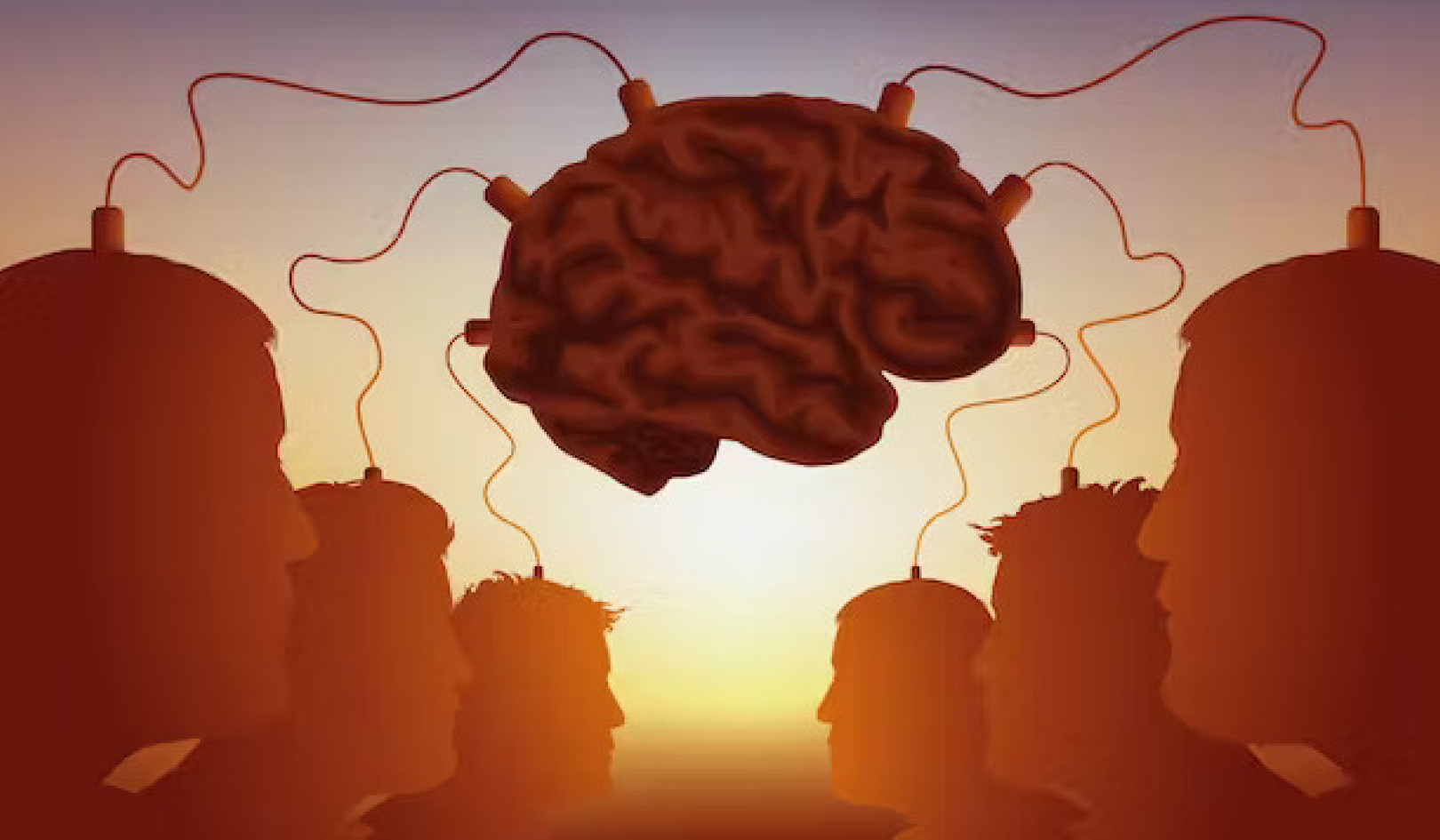
When we are born, we cannot conceptualize of ourselves as being different to others. Our ego is not formed yet. We experience the distress of others as our own. But as we grow, we begin to conceptualize ourselves as having autonomous feelings and desires. This is when the table flips. We still don’t fully conceptualize of other people as different to ourselves. But instead of seeing ourselves as an extension of the world around us, we see everything in our world as an extension of ourselves.
To understand this concept better, imagine a two-year-old child. The average two-year-old perceives that the world revolves around him or her completely. Essentially, we have an egocentric worldview. This is why we take everything personally as children because we can’t practise external consideration yet.
So now we go back to the toddler. He doesn’t think about how his whining or crying affects his mother. He simply whines and cries because that is the truth about how he feels. Likewise, the two-year-old doesn’t think about the perspectives or feelings of a kitten he encounters. He picks it up by the neck because that is the most convenient way for him to pick up the kitten. When the kitten screams in pain and terror, he doesn’t understand what the kitten is experiencing, so he doesn’t think to put the kitten down. Potentially the kitten could die and then the two-year-old will be confused about what happened and isn’t aware he had anything to do with it, because he was not attuned to the kitten.
What Is "Attunement"?
Attunement is being in harmony or bringing into harmony where you experience being “at one” with something. The best way to understand attunement is to imagine sitting in your car and reaching out for the radio dial. If you want to hear the music being played at a specific frequency, like 98.2 FM, you need to tune your radio dial accordingly. Then you will hear the music. Your own radio dial needs to be brought into harmony with or become one with the radio channel you want to receive in order to perceive that radio channel.
It’s no different with other beings, including people. To be able to perceive other people and to feel, see, hear, understand and communicate with them, you need to attune to them. You need to tune in to them as if you are them so you can feel or imagine that other person’s emotional experience and understand what they are feeling. This is what allows you to know what to do in any given situation to end conflict, to improve a situation or to assist someone.
Attunement naturally gives rise to empathy. The most dangerous people in the world are people who are in an egocentric bubble. They are essentially toddlers in a grown-up body holding kittens by the neck. But those kittens are other people. And even though it would be great if all people just naturally developed out of the egocentric bubble and into attunement, the reality is that some people don’t. They stay in a reality built for one.
When you are in a relationship with this kind of person, you end up feeling lonely, unseen, unheard, unfelt, misunderstood and abused. You will feel like you are living in an entirely different reality than the other person. You will feel this way because you quite literally are. You and this person are on entirely different frequencies and they are unwilling to tune in to yours. It’s the same as trying to find harmony when you are on the 98.2 FM station and your partner is on the 94.5 AM station.
How Attuned Are You?
Attunement is when you are able to understand that other people think in ways that are both similar to and different from the way that you do, and that they also have emotions they associate with those thoughts.
The development of attunement and healthy empathy has to do with how we are raised. We learn by virtue of example primarily. We learn attunement when other people are attuned to us. Ask yourself the following questions: “Do I feel like my parents understood me when I was little, or even tried to understand me? Did they see into me and feel into me and have empathy for me and adjust their behaviour accordingly or not? Did they acknowledge how I felt or did they invalidate it, telling me I shouldn’t feel that way? How did my parents treat me when I was cranky, frightened or upset?”
When our parents were not attuned to us, we went one of two ways to cope with the terror of that experience:
1. We learned that our survival depended on disconnecting from them and retreating into a narcissistic bubble where all that was real and all that mattered was our individual experience.
2. We learned that our survival depended on being hyper-attuned to the people in our lives so that we could perceive them, anticipate their behaviour and make adjustments to our behaviour accordingly in order to avoid harm to ourselves.
There are benefits and drawbacks to both coping styles but neither state is healthy. It’s not a fulfilling life to spend all your energy obsessively trying to keep yourself safe by attuning to other people. To do that, you end up tuning out to yourself.
But here are the big benefits to being attuned and why it’s worth striving to reach this goal. You cannot be attuned to a child and have them grow up narcissistic or co-dependent. You cannot be attuned to someone and drop a bomb on them or shoot them. You cannot be attuned to someone and say the wrong thing to them. You cannot attune to someone and stay in denial about his or her reality. And the bottom line is: unless you learn how to attune, your relationships will be riddled with conflict and painful for everyone around you, eventually making it painful for you as well.
The Attunement Game
Attunement begins with a choice similar to the choice to turn your car dial to the radio station you want. You are not going to understand this concept at an emotional level yet, so instead think of it as awareness and watching the world around you and the people in it. Consider that you are living your life in a bubble where nothing can come in. There are layers and layers in between you and them. You’ve got to pop that bubble so you can see them, feel them, hear them and really tune in to their frequency.
Start making a practice of really watching the world as if you are an FBI agent whose job is to perceive every single thing you can perceive about your environment and the people in it. Make a game of it.
Face any resistance you feel to coming out of the egocentric bubble if that is the coping strategy that helped you survive childhood. Know now that it’s harming people around you and ultimately this harms you in the long run. Start by being honest with yourself about why you don’t want to attune to other people.
Ask yourself: “What would attuning to other people mean? What would be so bad about really seeing them, feeling them, understanding them and perceiving their reality?”
The bubble around you is about controlling your own reality, but ask yourself now, “Why do I need to control my reality?” It’s tempting to think that the egocentric bubble is a good thing because it feels better than becoming aware of things that don’t feel good.
But don’t confuse this with deliberate creation of your reality. There is a difference between creation of reality and resistance to reality. The egocentric bubble is the opposite, like an addiction, it’s an escape. It’s a resistance to what is. This is why, inevitably, it leads to negative results like failed relationships and aloneness.
Once you are willing to be vulnerable enough to really feel strong emotion, including what other people feel, everything changes. Attunement causes you to experience strong authentic emotions as opposed to emotions related to suppression, avoidance, denial or defensiveness. For example, feeling the sadness inside someone may make you cry. Let this process happen. If you are concerned with staying strong and not being vulnerable, you won’t let yourself attune to anyone when they are in a state that threatens your own sense of peace.
When it comes to attunement, you cannot rush into action. In fact, you cannot even see the right action to take or the solution. Imagine seeing a fish in a tank that is sick. If you rushed into a solution, you might feed the fish. You simply guessed at what was wrong, so assumed the solution was to feed the fish. You were not attuned enough to see that the fish actually needed you to change the water.
The same is true for people. Become fully attuned and aware of the other person, and from there a solution will naturally arise and this time it will be the right one.
HOW TO PRACTISE ATTUNEMENT
If no one properly attuned to you when you were little, you didn’t grow up attuned to yourself. So a good place to start is to try to tune in to your own emotions. Whenever you experience things that either cause an emotional reaction, or that you think should cause an emotional reaction, ask yourself the following questions and be as brutally honest about them as you can.
* What was my perception of what happened?
* What was troubling to me about what happened?
* What were the emotions that I felt at the time it happened?
* What emotions am I feeling in this exact moment?
* What do I really need from other people in this circumstance?
Once you see the answers you have given to these questions, ask yourself, ?
* What do I feel like I need to do now given these answers I have now become aware of?”
©2018 by Teal Swan. All Rights Reserved.
Published by Watkins, an imprint of Watkins Media Limited,.
www.watkinspublishing.com
Article Source
The Anatomy of Loneliness: How to Find Your Way Back to Connection
by Teal Swan
 Loneliness, is a feeling of separation or isolation, it is not necessarily the same as the physical state of being alone. This book is for people who suffer from loneliness, the kind that cannot be solved by simply being around other people. Their aloneness is a deeply embedded pattern that is both negative and painful; it is often fueled by trauma, loss, addiction, grief and a lack of self-esteem and insecurity. In The Anatomy of Loneliness, Teal identifies the three pillars or qualities of loneliness: Separation, Shame and Fear and goes on to share her revolutionary technique; The Connection Process.
Loneliness, is a feeling of separation or isolation, it is not necessarily the same as the physical state of being alone. This book is for people who suffer from loneliness, the kind that cannot be solved by simply being around other people. Their aloneness is a deeply embedded pattern that is both negative and painful; it is often fueled by trauma, loss, addiction, grief and a lack of self-esteem and insecurity. In The Anatomy of Loneliness, Teal identifies the three pillars or qualities of loneliness: Separation, Shame and Fear and goes on to share her revolutionary technique; The Connection Process.
Click here for more info and/or to order this paperback book and/or download the Kindle edition.
About the Author
 TEAL SWAN was born in Santa Fe, New Mexico with a range of extrasensory abilities, including clairvoyance, clairsentience, and clairaudience. She is a survivor of severe childhood abuse. Today she uses her extrasensory gifts as well as her own harrowing life experience to inspire millions of people towards authenticity, freedom and joy. Her worldwide success as a modern spiritual leader has earned her the nickname “The Spiritual Catalyst.” She is the bestselling author of three books; The Sculptor in the Sky, Shadows Before DawnandThe Completion Process. Visit her at https://tealswan.com/
TEAL SWAN was born in Santa Fe, New Mexico with a range of extrasensory abilities, including clairvoyance, clairsentience, and clairaudience. She is a survivor of severe childhood abuse. Today she uses her extrasensory gifts as well as her own harrowing life experience to inspire millions of people towards authenticity, freedom and joy. Her worldwide success as a modern spiritual leader has earned her the nickname “The Spiritual Catalyst.” She is the bestselling author of three books; The Sculptor in the Sky, Shadows Before DawnandThe Completion Process. Visit her at https://tealswan.com/
Books by this Author
at InnerSelf Market and Amazon

























